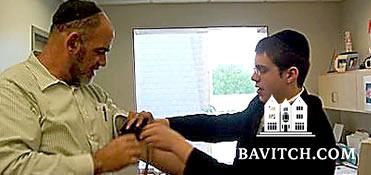Bisbee, AZ, (population 6,000) whose saloons once buzzed with miners, boisterously carousing over finds in copper lodes, is where rabbinical student Yehoshua Lustig went digging for Jews last summer.
Lustig, and his partner, Yaakov Majesky, found one of Bisbee’s 35 Jewish residents, Joan Werner, at Atalanta Book and Music Store. ‘It was really amazing to have them come here in the middle of Jewish nowhere,’ said Werner. ‘They were knitting together the different Jewish people here.’
Banging in a mezuzah on Werner’s mother’s apartment doorway, the rabbinical students established a Jew-to-Jew bond, kept up over emails and phone calls before Rosh Hashannah, Chanukah and Passover. In a few weeks, Lustig, 21, will board a plane back to Arizona, with a new partner Meir Rivkin, and follow the road to back to Bisbee, Sierra Vista, Yuma, Lake Havasu, Prescott and other cities across the state. Suit bags in one hand, duffels filled with Jewish literature, mezuzahs, tefillin, candlesticks in the other, Lustig and Rivkin are among the 280 Chabad yeshiva students who will board planes, drive beat up hatchbacks, call up Jewish-sounding names in the phone book, set up meetings to bring Judaism to Jews in homes and offices from lush Huaraz, Peru to steamy Tuxedo, NY; from straight laced Hof, Germany to free and easy Malaga, Spain. On the Turks and Caicos Islands, Thailand, Laos, the young men, between 18-24 years old, will be doing more than casual meet and greet.
Around the world, the Merkos Shluchim, as they are called, will be continuing 62 years of Chabad-Lubavitch tradition, founded by the Lubavitcher Rebbe, of blessed memory, creating the possibility of a more vibrant Jewish life where even the most imaginative hesitate to tread.
Among the gated communities in Doral, a newly incorporated offshoot of Miami, Rabbi Avrohom Brashevitzky is already impressed by the initiative of the yeshiva students. They’ve requested brochures to distribute, and the Doral team and the rabbi have worked out lists of Jews in the area, maps, and itineraries. Youthful idealism and the oomph of studying at the world Lubavitch headquarters, endows the students with a psychological ‘passport to go into an office and make the first contact with Jews in the area,’ said Rabbi Brashevitzky, ‘They’ll meet people I’ve not yet had a chance to reach.’ In Doral for just about a year, Rabbi Brashevitzky benefited from Merkos L’Inyonei Chinuch’s commitment to footing the bill for Merkos Shluchim plane tickets and other logistical expenses. An expanded number of locations and higher gas prices pumped this summer’s budget up to the $750,000 mark.
‘Most of the thriving Chabad Houses around the world today,’ explains Rabbi Moshe Kotlarsky, Vice Chairman of Merkos, ‘began with these visits by our rabbinical students.’ Upon their return, students report back to Headquarters where community needs are evaluated and follow-up is planned accordingly, often resulting in full time Chabad placement.
Visits by the rabbinical students last anywhere between two weeks and two months. Short stays, big impact. Two years ago, Merkos Shluchim created such a bond with graduate students, faculty families, and undergrads hitting the books over the summer at University of Connecticut that Rabbi Yosef and Yehudis Wolvovsky of Chabad of the East River in Glastonbury, CT, undertook the establishment of a permanent Chabad center on campus. ‘We knew about the interest on campus in the abstract,’ said Rabbi Wolvovsky, ‘but the [Merkos Shluchim] brought it to reality.’ This summer, one of the two groups working with Rabbi Wolvovsky will be based in Middletown, home of the elite Wesleyan University, testing the waters for more expansion.
Moving vans pulled up at Rabbi Shaya and Chana Susskind‘s Brooklyn apartment a week earlier than planned to bring the couple to their new home in Western North Carolina in time for the arrival of their rabbis-in-training. But Shimon Susskind and Levi Teldon will not be unpacking the linens. ‘I’d rather they spend the time meeting more Jews and getting the word out that Chabad is here,’ said Rabbi Susskind from his home in Asheville. Within their first week, Teldon and Susskind encountered a young man living in a sprawling complex, eager to include them at the Friday night dinner held with sixteen Jewish neighbors each month. The yeshiva students bought a bouquet and get well card for one woman, reluctant to invite them in because she was recovering from surgery. An offer to help a man wrap tefillin was quickly accepted, saying, ‘Every time I put on tefillin, it’s with Chabad.’ Rabbi Susskind said, ‘I don’t know of another way we could be introduced to the community as quickly.’
Or as positively. Months after Majesky and Lustig visited Sara Knox of Sierra Vista, AZ, she wrote to thank them. ‘Rather than berating and chiding me for not trying harder to be ‘~more Jewish,’ you complimented me on doing what I am doing in the midst in a not very Jewish community.’ Knox’s son, Jethro, 2, blows kisses at the mezuzah nailed to the doorpost by the rabbinical students, and daughter, Hannah, 6, has taught her playmate, Destiny, to do the same.
Encounters like these are what Cheskel Rothman, 24, is aiming for when he reaches Deadwood, South Dakota, and a dozen other one-horse stops in the Dakotas. Completely unfamiliar with the town, and unaware of its linkage to an eponymous cable hit, Rothman steels himself for every potential encounter with this thought, ‘I think about the enjoyment they will get, how they will appreciate the fact we came to visit them,’ said Rothman. He knows he’ll be listening, mostly, answering concerns about their childrens’ ambivalence about Judaism. They’ll talk. He’ll sip soda. He’ll share the strength of a Jewish story, that it’s never too late and every good deed makes a difference.

Be the first to write a comment.